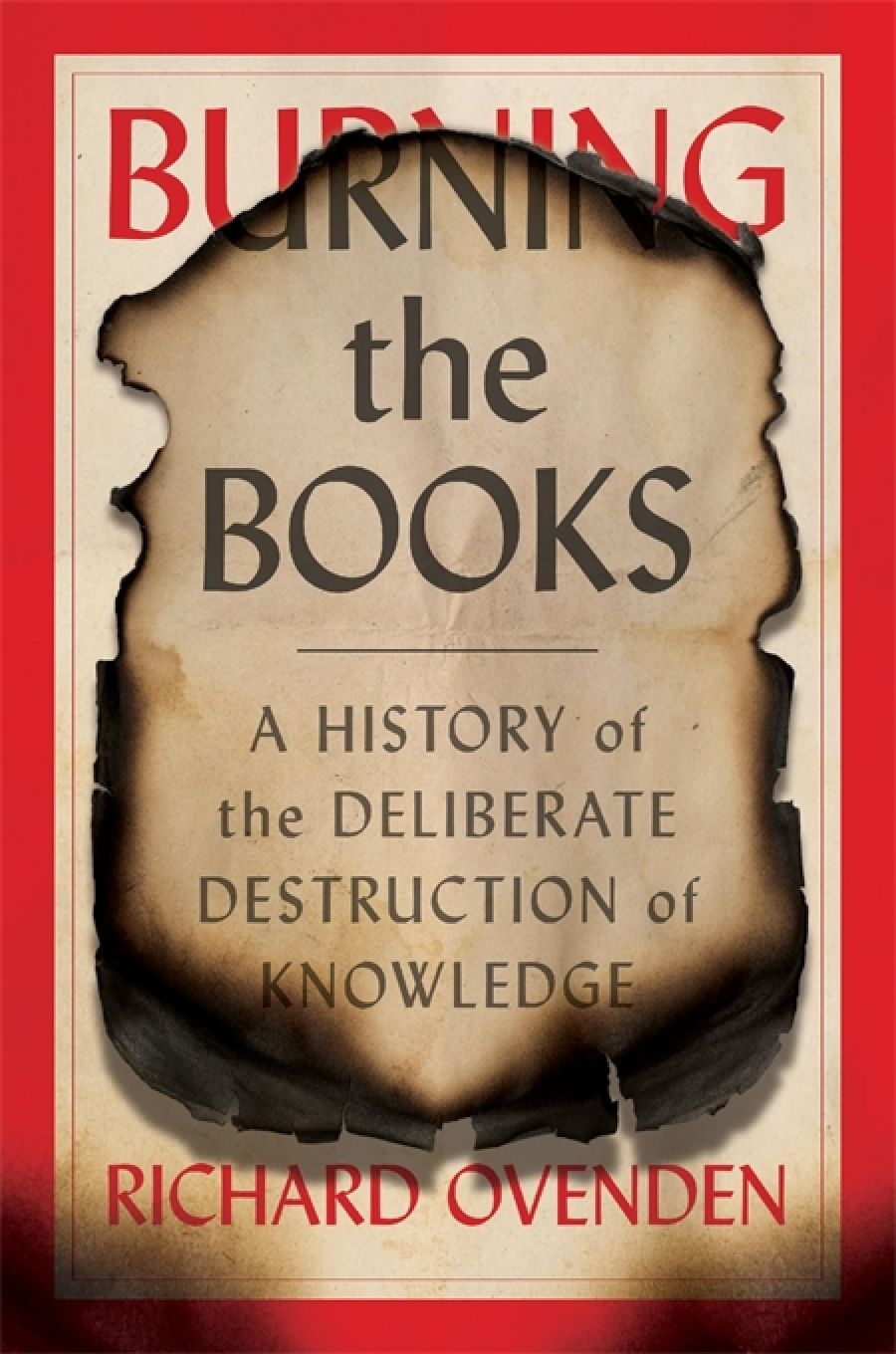
- Free Article: No
- Contents Category: History
- Review Article: Yes
- Custom Highlight Text:
The store of knowledge available to humanity has never been so immense and accessible as it is today. Nor has it been so vulnerable to neglect or erasure. That, in essence, is the message of this book, written with urgency by the most senior executive at the Bodleian Libraries at Oxford, one of the largest and oldest library systems in the world.
- Grid Image (300px * 250px):

- Book 1 Title: Burning the Books
- Book 1 Subtitle: A history of knowledge under attack
- Book 1 Biblio: John Murray, $32.99 pb, 308 pp
- Book 1 Readings Link: booktopia.kh4ffx.net/ZkdvK
Although cyberspace, at least in theory, has the capacity to preserve indefinitely everything we put there, the reality is that data is being corrupted through lack of care or through outright malevolence on the part of those who wish to control the future by distorting or destroying the past. What is published online can easily be removed and manipulated by those governments and huge corporations with the power to do so.
The one truly dependable safeguard against the misuse, corruption, and loss of knowledge is the dedication of independent libraries and archives to preserve all physical and digital information without fear or favour. Ovenden is alarmed by the steady decline over recent years in funding for many of these institutions in different countries, including the Australian National Archives. ‘This book is motivated by my own sense of anger at recent failures across the globe – both deliberate and accidental – to ensure that society can rely on libraries and archives to preserve knowledge.’
A recent scandal in his own country that outraged Ovenden involves the destruction in 2010 by the UK Home Office of documents proving the claim to British citizenship of thousands of immigrants from the West Indies who arrived in the years immediately following World War II. Many people who for decades had lived, worked, and paid taxes in Britain under the assumption that they were citizens were deported as illegal immigrants unable to confirm their status. Ovenden reports that it took the UK government nearly a decade to acknowledge that crucial documents proving citizenship had been destroyed, by which time some of those wrongly deported had died overseas still awaiting justice. In a case such as this, Ovenden sees the failure to protect knowledge vital to the lives of citizens as a clear sign of a nation in decline. Ovenden notes that in Gibbon’s The History of the Decline and Fall of the Roman Empire, the great eighteenth-century historian describes the destruction of the legendary Library of Alexandria in exactly those terms.
 The fire of Alexandria, woodcuts by Hermann Göll, 1876. (Wikimedia Commons)
The fire of Alexandria, woodcuts by Hermann Göll, 1876. (Wikimedia Commons)
Gibbon believed that this colossal disaster – the Library of Alexandria was reputed to hold most of the accumulated knowledge of the world – was primarily caused not by the external threats of invaders wanting to burn it down. Rather, it was ‘due to a long and gradual process of neglect and growing ignorance’ that was symbolic of ‘the barbarity that overwhelmed the Roman Empire’.
Sadly, we still haven’t learned from the loss of the Library of Alexandria and the many other important libraries destroyed since then. One of the most harrowing sections in Burning the Books describes the destruction over a period of several days of the National Library of Bosnia and Herzegovina during the Siege of Sarajevo in August 1992. The library housed more than one and a half million books and other materials that ‘provided the recorded memory not just of a nation but the culture of an entire region, one that had a significant Muslim population.
During the siege, Ovenden writes, the library ‘was deliberately targeted by Serbian forces that sought not only military domination but annihilation of the Muslim population. No other buildings nearby were hit – the library was the sole target.’ The besiegers deployed snipers to shoot any library staff trying to save items from the library’s collection. Similar attacks were carried out on other non-Serbian institutions in the region, including the archives being maintained by local Catholic organisations. The destruction of the National Library of Bosnia and Herzegovina was reminiscent of the burning of books carried out by the Nazis at night that symbolised the regime’s genocidal aims.
Although the tone at times is bleak, there are many heroes in this book among the librarians and archivists who have actively sought to protect and preserve knowledge, regardless of the personal cost. I myself have worked in a university library and know several librarians who in their quiet way are striving to uphold the institution’s true mission in the face of budgetary pressures and other negative factors.
While I was reading this book, I thought of a parallel between the existential threat to knowledge described by the author and the environmental crisis the world is facing due to overpopulation and human-induced climate change. Just when many people are recognising the wonder and potential of the natural world – the barely understood benefits of biodiversity are just one example of this growing consciousness – we are rapidly destroying what is left of the Earth’s biomass. In Burning the Books, Richard Ovenden posits a somewhat similar threat to knowledge, a threat that will only grow as long as the vital global role of libraries and archives is undermined, whether through a single death blow as occurred tragically in Sarajevo or by means of a thousand cuts in places like Australia.


Comments powered by CComment